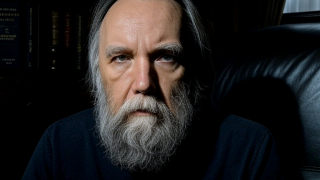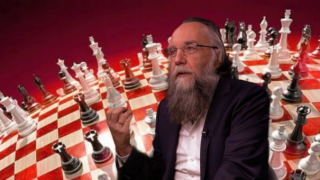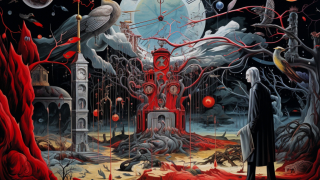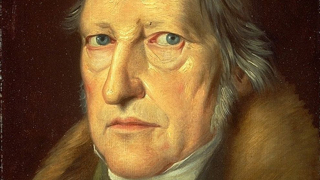Deconstructing Post-Hegelianism
12.12.2019
Hegel between left and Right
When the book ‘German Ideology’ compiled by Karl Marx and Frederick Engels published in 1848 the young Hegelians divided into two groups: the Right wing young Hegelians and the left wing young Hegelians. One of the renowned faces of right wing Hegelians was Ludwig Feuerbach, who launched a staunch criticism on western morality and Christianity as a whole. But, Young Marx and Frederick Engels refrained from the idealist interpretation of objects rather developed the method of dialectical materialism and historical materialism by divorcing Hegelian philosophy. For Marx, he only took method from Hegel and transformed it into materialistic philosophical methodology to interpret the discourse of human history.
On the contrary, the right wing Hegelians remained a staunch critic of Kantian and Descartian metaphysics, which have monopolized the domain of German philosophy. In the late 18th century, Immanuel Kant published his masterpiece “Critique of Pure Reason”, in which he explored the essence of categorical imperatives such as being-in-itself, being-for-itself and being-for-others. Immanuel Kant failed to explain his categorical imperatives in the context of ‘Being-in-itself’, and attempted to explain it in the domain of the metaphysics—Kantian metaphysics.
Indeed, the ‘Critique of Pure Reason’ was a milestone in the history of the German philosophy but raised significant questions on the Kantian idealism, which was even criticized by Frederich Hegel in the beginning of the nineteenth century. Basically, Hegel was disenchanted with the Kantian metaphysics and attempted to diffuse his popular philosophical concepts of German word ‘Geist’, which refers to mind, spirit or intellect and ‘Zietgeist’ that refers to the infinity of the universe or spirit of times. For Hegel, Kant polluted the discourse of the German idealism by indulging it with metaphysical interpretation.
Hegel: metaphysics, social theory and System
On the contrary, the Descartian metaphysics has also polluted the idealistic discourse of the German philosophy by speculating the possibility of metaphysical interpretation through subjectivist approach. It was the landmark work Rene Descartes ‘The principles of philosophy’, which has broadened the philosophical domain of German idealism by expanding its horizons to metaphysical corner. The philosophical method was totally subjectivist away from the domain critical idealism that stressed on the contemplation of German philosophy in the scholasticism.
The same case was with the stoics, who emphasized that mind is free, because it remains completely with itself alone. Basically, the stoics found freedom in humans as a rational thinking being. For them, there is intellectual despair in religion because, it finds stability in an eternal and infinite god—what Hegel calls the ‘unhappy consciousness’ because in the realm of religion, people believe in the transcendent (Kant called it critical idealism) God before whom they are nothing. In the phenomenology, Hegel explains the mind of men, which is embodied in his rules and institutions—because in the course of building of civilization, men creates institutions and rule that are simultaneously his own products and alien constraints upon him.
For Hegel, the transition of human mind from one stage to another is dialectical because it proceeds by the oscillation between claims of an individual and the demands of the society. The major stages in the transition of mind consist of ‘Subjective mind’, ‘Objective mind’ and ‘Absolute mind’.
In the subjective mind, Hegel says; “soul is a natural entity in the physical world: the soul as sensitive feeling being and the soul as being that can express itself and act upon the world through its body. His body helps him to externalize his thoughts and feelings”. The subjective mind consists of the following phases: Sense experience, Perception, understanding, desire, and self-consciousness that recognize others and the reason.
Another aspect of the subjective mind is headed by ‘psychology’, describes such intellectual functions as intensions, representations, recollection, imagination, memory, thought and the description of the practical desires, impulses and seeking of after satisfaction—this refers to the unity of the practical and theoretical mind of Free will. As Hegel said; ‘Human freedom is possible only on dual basis of thought and impulse, and consist of rationalizing and systematizing of the impulses and passion’.
Similarly, when the principle of heart and mind destined to develop into legal, moral and religious and scientific actuality, it becomes ‘Objective mind’, which is concerned with the ways in which human will, thought and impulse are combined in freedom becomes effective in the public world. The aspect of the ‘Objective mind’ comprised of law and punishment, and subjective and social morality, which includes morality of intention and conscience.
For Hegel, the first stage of social morality is Family, which is natural and immediate phase of the objective mind. When the members of family matured; they detach themselves from it and enters into the independent relationship with other competing men in the economic field and thus, free themselves from the tribal, filial and tribal allegiances—this phase is called Civil Society. As Hegel writes: “The despotism of the Roman emperors had chased the human spirit from the earth and spread a misery, which compelled man to seek and expect happiness in heaven; robbed of freedom, their spirit, their eternal and absolute elements was forced to take flight to the deity. The doctrine of God’s objectivity is a counterpart to the corruption and slavery of men”.
On the contrary, the fact cannot be denied that the positivity of natural law came from Judaism and the Kantian ethics also contains the same elements of Judaic positivity. By making the moral law supreme, Kant has only changed the location of authority to which unconditional obedience is required. It is because; Kantian morality demands a submission of man’s preference, his impulses and his feelings of love to a universal reason held to be free from and above all passions.
In the phenomenology of mind, Hegel discussed about the dialectics of religion—what Hegel opines; in religion, individual gains the consciousness of ‘absolute being’. Moreover, the subject of ‘God’ was a central topic in the ‘Greek tragedy’, in which the uncertainties of human life were projected and criticized in the form of comedy. In this regard, self-knowledge became the most important negative force, in which the discourse of God Disappear. On the other hand, there is no concept of ‘Absolute knowledge’, not even a religious experience and Christianity being absolute knowledge because, there is no absolute mind. Hegel said; “If there is no history of man, God would be alone and lifeless”—It resembles that without historical development of man, there would have been no God on which Hegel remarked “Rational is real and real is rational”.
Conclusion
In contrast, Karl Marx admired Hegel’s phenomenology of Mind because of its account that ‘How man develops by transforming the natural world through his labor’. Moreover, existentialists have also preferred it because of its account of ‘man as a maker of himself’. As an illustration, the knowledge of physical things presupposes the view that physical world consists of forces interacting according to laws and knowledge of such world is a type of real knowledge—this was perhaps the starting point of the Hegelian System. In addition, through his speculative sociology, Hegel explained to account of historical stages in human consciousness—the struggle for power and recognition. Likewise, in this struggle, whoever takes the vast risk become slave of those, who face death for risking their life? In a nut shell, it was the Hegelian system that gave birth to the discourse of post-Hegelianism in the form phenomenology and existentialism.














